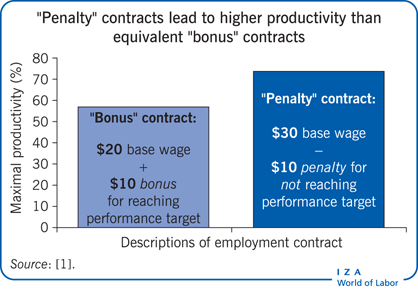Elevator pitch
Firms regularly use incentives to motivate their employees to be more productive. However, often little attention is paid to the language used in employment contracts to describe these incentives. It may be more effective to present incentives as entitlements that can be lost by failing to reach a performance target, rather than as additional rewards that can be gained by reaching that target. However, emphasizing the potential losses incurred as a result of failure may entail hidden costs for the employer, as it may damage the trust relationship between a firm and its employees.
Key findings
Pros
Employees work harder when incentives are described as entitlements that can be lost by failing to reach a performance target than when they are presented as extra rewards to be gained by reaching that target.
Modifying the description of incentives has virtually zero financial costs for firms.
The way incentives are described does not seem to matter for the types of employees attracted by a firm.
Emphasizing losses incurred as a result of failure does not seem to discourage employees from signing employment contracts.
Cons
Penalty contracts are perceived as more unfair and controlling than bonus contracts.
There is some evidence that contracts that emphasize losses lead to more cheating and corrupt behavior among employees.
When contracts do not regulate all possible aspects of performance, penalty contracts may lead to a reduction of effort in the tasks that are not directly regulated by the contract.
Penalty contracts are rarely used by firms, suggesting that employers may be particularly wary of their cons.
